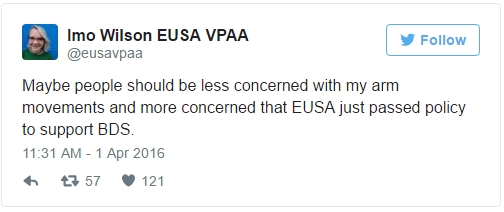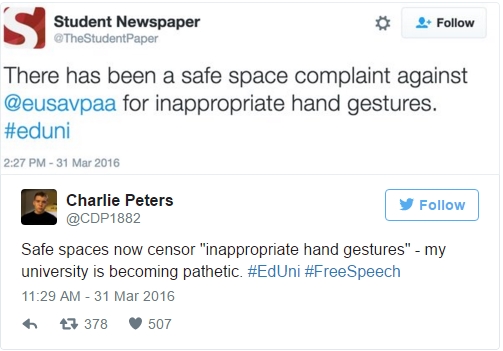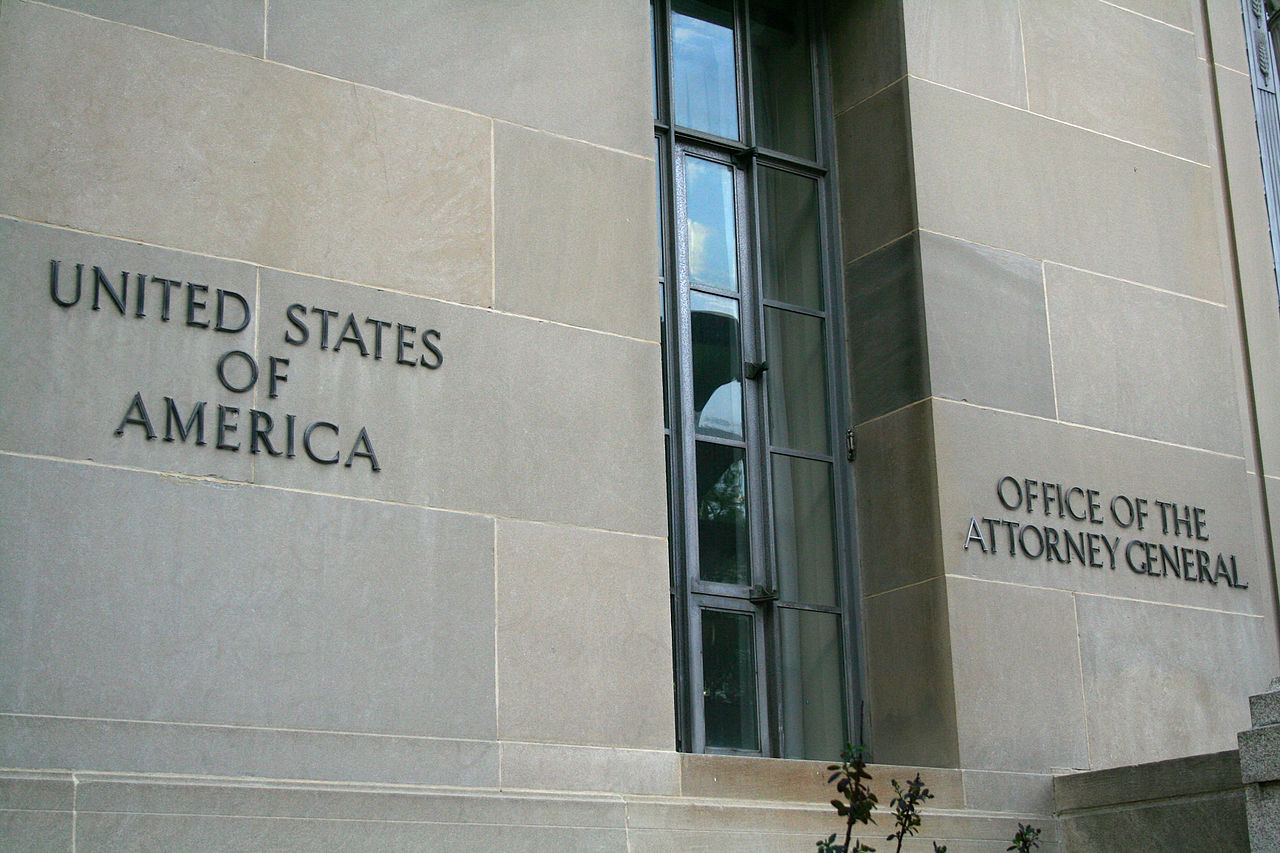
Advertisement
A university student was threatened with being thrown out of a meeting after being accused of violating “safe space” rules – by raising her hand.
(Article by Emily Gosden, republished from //www.telegraph.co.uk/news/2016/04/03/student-accused-of-violating-university-safe-space-by-raising-he/)
Imogen Wilson, the vice-president for academic affairs at Edinburgh University Students’ Association (EUSA), spoke out against safe space rules becoming “a tool for the hard left to use when they disagree with people”, following the incident last week.
Ms Wilson, 22, was subject to a “safe space complaint” over her supposedly “inappropriate hand gestures” during a student council meeting.
“Safe space is essential for us to have a debate where everyone can speak, but it can’t become a tool for the hard left to use when they disagree with people.” Imogen Wilson
According to the association’s rules, student council meetings should be held in a “safe space environment”, defined as “a space which is welcoming and safe and includes the prohibition of discriminatory language and actions”.
This includes “refraining from hand gestures which denote disagreement”, or “in any other way indicating disagreement with a point or points being made”.
“Disagreements should only be evident through the normal course of debate,” it says.
Ms Wilson said she raised her arms in disagreement after being accused by another speaker of failing to respond to an open letter, despite in fact having made efforts to contact the letter’s authors.

A complaint was made against Ms Wilson, who was then subjected to a vote on whether she should be removed from the room.
Although the vote went in her favour, with 18 people voting to remove her and 33 voting for her to be allowed to remain, she was later threatened with another complaint after shaking her head while someone was speaking.
Ms Wilson said she believed that safe space rules banning gestures of disagreement, which were drawn up under the tenure of previous sabbatical officers, were “a little extreme” and had been used as a “political” tool against her after she spoke out against anti-Semitism.
This includes “refraining from hand gestures which denote disagreement”, or “in any other way indicating disagreement with a point or points being made”.
“Disagreements should only be evident through the normal course of debate,” it says.
Ms Wilson said she raised her arms in disagreement after being accused by another speaker of failing to respond to an open letter, despite in fact having made efforts to contact the letter’s authors.
A complaint was made against Ms Wilson, who was then subjected to a vote on whether she should be removed from the room.
Although the vote went in her favour, with 18 people voting to remove her and 33 voting for her to be allowed to remain, she was later threatened with another complaint after shaking her head while someone was speaking.
Ms Wilson said she believed that safe space rules banning gestures of disagreement, which were drawn up under the tenure of previous sabbatical officers, were “a little extreme” and had been used as a “political” tool against her after she spoke out against anti-Semitism.
“I totally do believe in safe space and the principles behind it,” she told the Telegraph. “It’s supposed to enhance free speech and not shut it down, and give everyone a chance to feel like they can contribute.
“Safe space is essential for us to have a debate where everyone can speak, but it can’t become a tool for the hard left to use when they disagree with people.”
She said: “At that meeting we were discussing BDS, the movement to boycott Israel. I made a long and passionate speech against us subscribing to this, on the basis it encourages anti-Semitism on campus. It was only after I made that speech that someone made a safe space complaint. I can’t help but think it was a political move against me.
“Later on in the meeting, someone threatened me with a second complaint because I was shaking my head – but when I was addressing the room about my worries about Jewish students, there were plenty of people shaking their heads and nothing happened.”
According to EUSA safe space rules, only gestures that indicate agreement are “permissible”, and then only as long as “these gestures are generally understood and not used in an intimidating manner”.
One Edinburgh university student, Charlie Peters, complained it was “pathetic” that hand gestures were “censored” and has started a petition calling on the student union to “reinstate and defend free speech”.
The petition, which has garnered more than 1,000 signatures, says: “We are adults, we do not need condescension or safeguarding.”
Last year, a group of leading academics wrote to the Telegraph warning that British universities were becoming too politically correct and stifling free speech by banning anything that causes offence to others.
They criticised the “small but vocal minority of student activists” arguing for universities to be turned into “safe spaces”, describing it as “an attempt to immunise academic life from the intellectual challenge of debating conflicting views”.
Read more at ://www.telegraph.co.uk/news/2016/04/03/student-accused-of-violating-university-safe-space-by-raising-he/
Submit a correction >>
This article may contain statements that reflect the opinion of the author
Advertisement
Advertisements

















